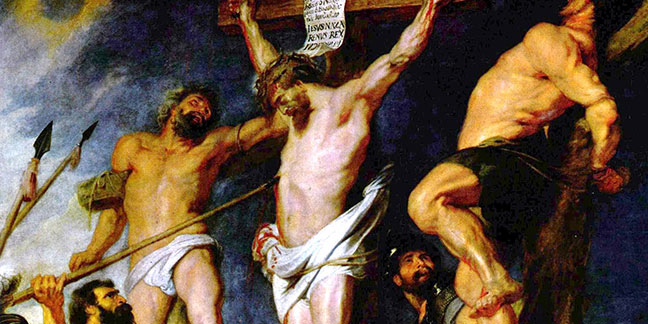 The feast of the Exaltation of the Holy Cross celebrates two historical events: the discovery of the True Cross by St. Helena, the mother of the Emperor Constantine, in 320 under the temple of Venus in Jerusalem, and the dedication in 335 of the basilica and shrine built on Calvary by Constantine, which mark the site of Jesus’ crucifixion.
The feast of the Exaltation of the Holy Cross celebrates two historical events: the discovery of the True Cross by St. Helena, the mother of the Emperor Constantine, in 320 under the temple of Venus in Jerusalem, and the dedication in 335 of the basilica and shrine built on Calvary by Constantine, which mark the site of Jesus’ crucifixion.
The basilica, named the Martyrium, and the shrine, named the Calvarium, were destroyed by the Persians in 614. The Church of the Holy Sepulchre which now stands on the site was built by the crusaders in 1149.
However the feast, more than anything else, is a celebration and commemoration of God’s greatest work: His salvific death on the Cross and His Resurrection, through which death was defeated and the doors to heaven opened.
The entrance antiphon for the Feast of the Exaltation of the Holy Cross is: “We should glory in the cross of our Lord Jesus Christ, for He is our salvation, our life and our resurrection: through Him we are saved and made free.”
— CNA/EWTN
Exaltation of the Holy Cross:
Early in the fourth century St. Helena, mother of the Roman Emperor Constantine, went to Jerusalem in search of the holy places of Christ's life. She razed the Temple of Aphrodite, which tradition held was built over the Savior's tomb, and her son built the Basilica of the Holy Sepulcher over the tomb.
During the excavation, workers found three crosses. Legend has it that the one on which Jesus died was identified when its touch healed a dying woman.
The cross immediately became an object of veneration. At a Good Friday celebration in Jerusalem toward the end of the fourth century, according to an eyewitness, the wood was taken out of its silver container and placed on a table together with the inscription Pilate ordered placed above Jesus' head: Then "all the people pass through one by one; all of them bow down, touching the cross and the inscription, first with their foreheads, then with their eyes; and, after kissing the cross, they move on."
To this day the Eastern Churches, Catholic and Orthodox alike, celebrate the Exaltation of the Holy Cross on the September anniversary of the basilica's dedication. The feast entered the Western calendar in the seventh century after Emperor Heraclius recovered the cross from the Persians, who had carried it off in 614, 15 years earlier. According to the story, the emperor intended to carry the cross back into Jerusalem himself, but was unable to move forward until he took off his imperial garb and became a barefoot pilgrim.
The cross is today the universal image of Christian belief. Countless generations of artists have turned it into a thing of beauty to be carried in procession or worn as jewelry. To the eyes of the first Christians, it had no beauty. It stood outside too many city walls, decorated only with decaying corpses, as a threat to anyone who defied Rome's authority – including Christians who refused sacrifice to Roman gods.
Although believers spoke of the cross as the instrument of salvation, it seldom appeared in Christian art unless disguised as an anchor or the Chi-Rho until after Constantine's edict of toleration.
"How splendid the cross of Christ! It brings life, not death; light, not darkness; Paradise, not its loss. It is the wood on which the Lord, like a great warrior, was wounded in hands and feet and side, but healed thereby our wounds. A tree has destroyed us, a tree now brought us life." (Theodore of Studios)
— AmericanCatholic.org
Exaltation of the Holy Cross Novena
Jesus, Who because of Your burning love for us willed to be crucified and to shed Your Most Precious Blood for the redemption and salvation of our souls, look down upon us and grant the petition we ask for ... (mention here).
We trust completely in Your Mercy.
Cleanse us from sin by Your grace, sanctify our work, give us and all those who are dear to us our daily bread, lighten the burden of our sufferings, bless our families, and grant to the nations, so sorely afflicted, Your peace, which is the only true peace, so that by obeying Your commandments we may come at last to the glory of heaven.
Amen.


